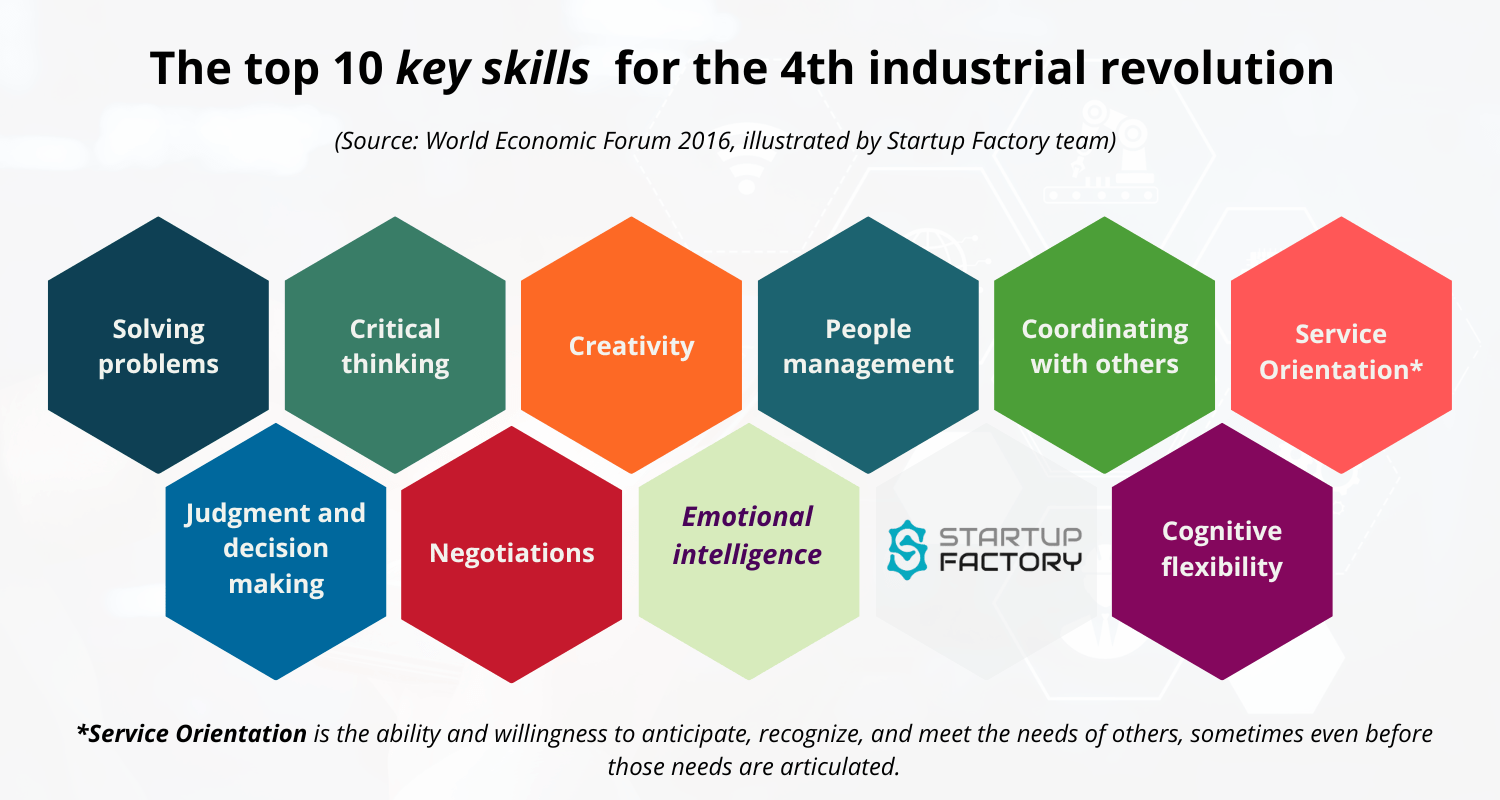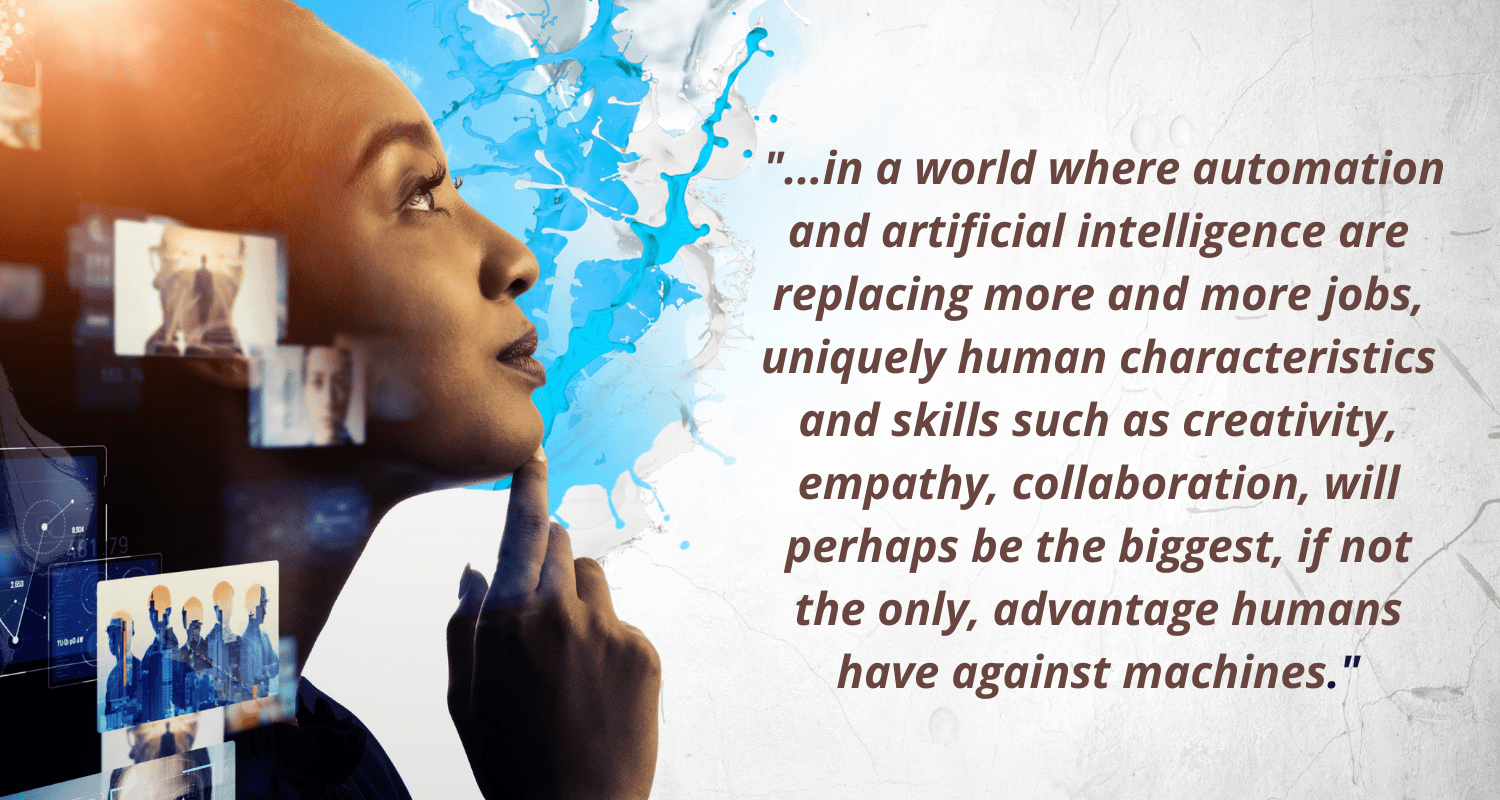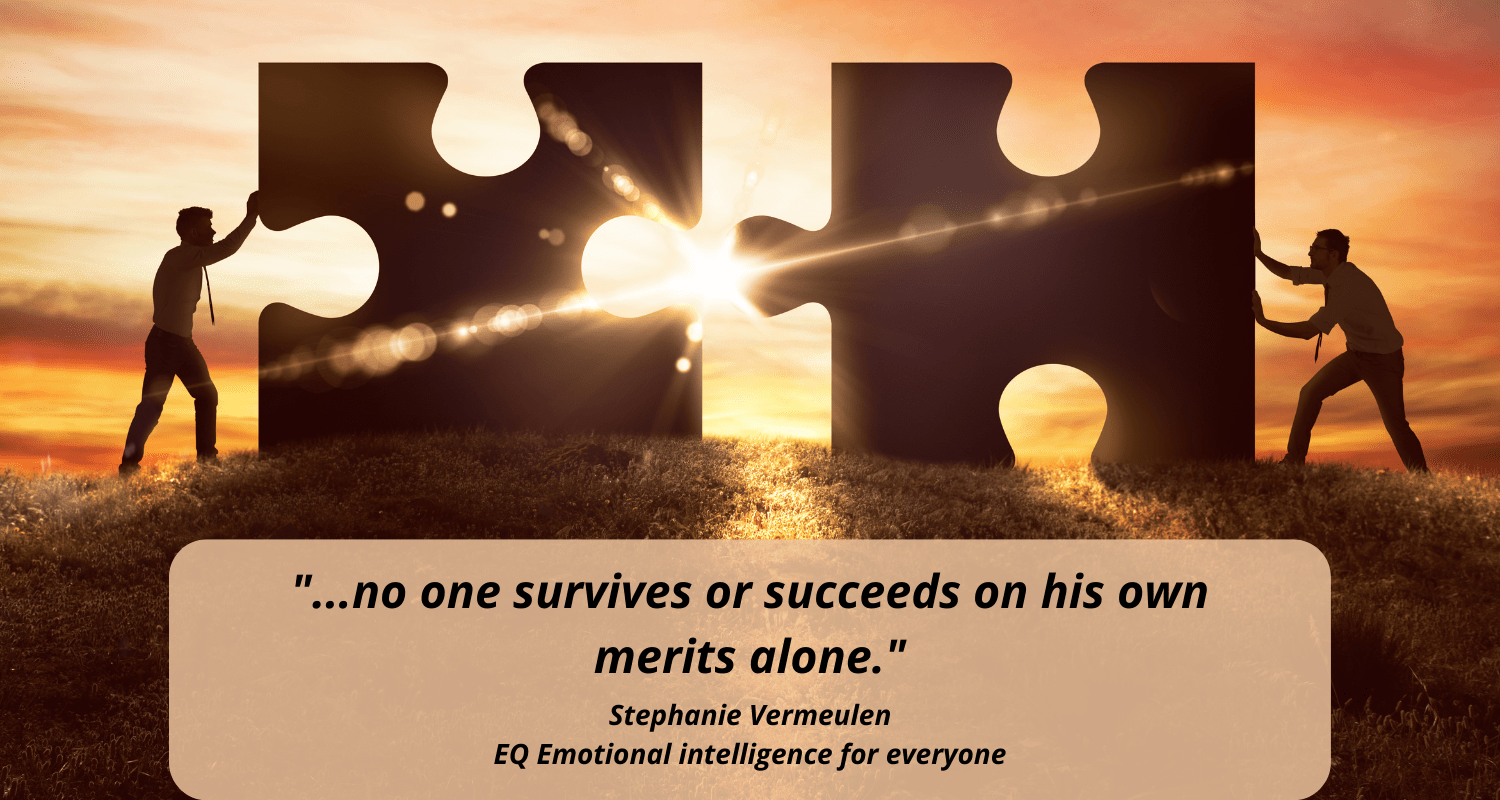In the context of entrepreneurship, business, economy and digitalisation, the “emotion” hardly finds a place.
But in fact, emotions drive people, and people drive business [1] and all related processes. I.e. the connection is on the face, but the focus in the past decades has been mainly on human intelligence. To allow emotions and emotional intelligence to play a leading role in management and leadership is more like blasphemy.
Until the middle of the 20th century, management was based primarily on top-down command and control principles, and little consideration was given to the subordinates to play a significant role through their unique human characteristics.
Emotional intelligence – among the top 10 skills of the fourth industrial revolution
In 2016 The World Economic Forum [2] includes “people management”, “collaboration” and “emotional intelligence” among the top 10 skills for the 4th industrial revolution, and in fact the first two skills are also part of the competencies of emotionally intelligent people .

The forum predicts that 2020 will bring advanced robotics, autonomous transport, artificial intelligence, advanced materials, biotechnology and genomics, and the preservation of human jobs will depend on key skills not inherent to machines: creativity, optimism, social relationships, such as emotional intelligence will become one of the most in-demand skills.
The social network for establishing business contacts LinkedIn also creates a list[3], up-to-date as of 2020, of the most sought-after “hard & soft skills” when hiring new employees, using data from over 660 million professionals and over 20 million. job ads The emphasis is on high demand hard skills, such as blockchain, cloud computing, artificial intelligence, marketing, sales, UX design, business analysis, etc., which are defined as the most sought-after hard skills. While the soft skills are creativity or the creative approach to problems and tasks, the skill of persuasion, cooperation and adaptability, and last but not least – emotional intelligence.

Whether or not the predictions of an innovation boom, as described by the World Economic Forum 5 years ago, have come true, or not, today, more than ever before, every innovation leaves a dramatic imprint on the thinking and therefore on the way of life of the individual.
Digitisation has become the norm – it is the indisputable present and the irrevocable future, and the entrepreneurship has developed in a new direction – digital entrepreneurship, which is gaining strength and popularity in Bulgaria. The future for it lies ahead.
➤ Learn more: Why is emotional intelligence critical for the carrier?
And if the emotional intelligence is among the top skills of the future, and digital entrepreneurship – the new business reality, then the question is reasonable: is there an intersection between them and how successfully do they coexist?
A number of researchers are united around the statement that regardless of technological (r)evolution, people remain the same deeply emotional beings who not only do not understand, but also do not know how to control their feelings. Quite the opposite – they are subject to any sudden emotion and their actions are guided by it.
Robert Wood, co-author of Professional EI Tests, expresses a similar opinion that “it doesn’t matter whether we like it or not, but emotions really do drive our character – not necessarily in a connected or meaningful way”[4] .
Undoubtedly, technologies have profoundly conquered the human being, changed the way of communication and work.
We can look at these changes from a positive angle – they create equal opportunities for everyone, but on the other hand – for people unprepared for the new realities, these trends seem frightening. “We can resist technological progress or fear it, but neither changes the fact that the electronic ‘explosion’ touches every thread of our lives.“[5] states Stephanie Vermeulen, author of EQ Emotional Intelligence for everyone. According to her, although it is claimed that technology takes man away from his primordial values and nature, paradoxically it turns out that at the same time they make him explore himself more and more. And the conclusion that can be drawn is that the constant flow of inventions only masks the fact that physically and emotionally people have not changed all that drastically.
Emotional intelligence (EI) is not a new phenomenon – only the higher emphasis on understanding and cultivating its competencies is new, and one of the reasons is the growing influence of technology and the fear of it.

Realistically, in a world where automation and artificial intelligence are replacing more and more jobs, uniquely human characteristics and skills such as creativity, empathy, collaboration, may be the biggest, if not the only, advantage humans have over machines. It is therefore imperative “to nurture human assets and consider how skills and competencies such as emotional intelligence, management, leadership, operational culture, skills and processes work individually and together to generate value“[6].
Emotional intelligence is also known as Emotional Quotient (EC) or Emotional Intelligence Quotient (EIK) and is generally perceived as a competency that helps an individual to build stronger relationships, succeed in their endeavours (school, work and etc.), to achieve their career and personal goals, to make sense of their actions, experience, experiences. It also helps you “get in touch with your feelings, turn intention into action, and make informed decisions about what’s most important to you“[7].
Harry Tolley and Robert Wood, “as seasoned observers of human behavior,” agree “that there is every reason to take emotional intelligence (EI) almost as seriously as mental intelligence, if not more so. People may not realize it, but evidence of emotional intelligence exists in all CVs, references, interviews and tax returns as an integral part of the recruitment and selection process.”[8]

Vermeulen gives one of the most descriptive definitions of EI, “introducing” the traditions of the African Ubuntu tribe to his readers:
“..although the media portrays Africa as a continent of violence, hunger and suffering, one of the most developed social systems the world has known has been created here, based on mutual support… [ ] … this system in its purest form represents AI in action. Instead of valuing money and power, Ubuntu values people and community. The manifestation of ubuntu is in living according to values and morals. This includes compassion, which is based on the deep-rooted understanding that no one is appreciated or succeeds on his own merits.” [9]
According to her, people with a high quotient of emotional intelligence are able to resist negative influences, and instead of focusing on how bad a given situation is, they look for opportunities to improve it. They manage to achieve this thanks to their will, control over reason, self-knowledge and awareness of “emotional baggage” and above all, their optimistic vision of life, especially their own life. “When it comes to bad news, emotionally strong people are prescient. They are well aware of the problem, but do not give in to pessimism. They understand the danger of the hopeless trap of negativity and choose to avoid it.“[10] As one of the most distinguishing traits of an individual with a healthy level of EI, Vermeulen points to the ability to control one’s impulses, and hence “the ability to delay gratification of desire”[11].
➤ Learn more: Utilizing A Secure Data-sharing App Makes Your Business Future-Proof
EI gives us the knowledge that feelings are not weakness, but are “our GPS system for life” – a kind of moral compass built on the basis of values and empathy.
Before a person takes an action, his emotional system alerts whether it is good or not, and “the trick is to stop the ego and let your inner voice… When you calm down and let your inner motivation take over, it will improve not not only your personal life, but you will also gain a competitive place professionally.“[12]
[1] Emotional intelligence, iQtest-bg.com, https://iqtest-bg.com/article.php?id=16
[2] Gray, A., The ten skills you need to thrive the Fourth Industrial Revolution, World economic forum, 2016, https://www.weforum.org/agenda/2016/01/the-10-skills-you-need-to-thrive-in-the-fourth-industrial-revolution/
[3] 15 skills Linkedin say will help you get hired in 2020 – and where to learn them, World economic forum, 2020, https://www.weforum.org/agenda/2020/09/linkedin-online-elearning-skills-jobs-hiring
[4] Wood, R., Tolley, H., Professional Tests of Emotional Intelligence, Locus Publishing, Sofia, page 13
[5] Vermeulin, S., EQ Emotional Intelligence for Everyone, Kibea, 2008, pages 14-18
[6] Hewitt, J., IQ, EI and AI – The Power of Emotional Intelligence in the digital Age, Hintsa, 01.04.2021, https://www.hintsa.com/iq-ei-and-ai-the-power-of-emotional-intelligence-in-the-digital-age/
[7] Improving Emotional Intelligence (EQ), HelpGuide, https://bit.ly/3amzAmr
[8] Wood, R., Tolley, H., Professional Tests of Emotional Intelligence, Locus Publishing, Sofia, page 7
[9] Vermeulin, S., EQ Emotional Intelligence for Everyone, Kibea, 2008, page 269
[10] Vermeulin, S., EQ Emotional Intelligence for Everyone, Kibea, 2008, page 117
[11] Vermeulin, S., EQ Emotional Intelligence for Everyone, Kibea, 2008, page 192
[12] Vermeulin, S., EQ Emotional Intelligence for Everyone, Kibea, 2008, page 215
The material is part of a Diploma Thesis (for the acquisition of the OCS “Bachelor” in the professional direction “Administration and Management”) on the topic “Researching the influence of emotional intelligence in digital entrepreneurship”, developed by graduate student Ana Todorova and successfully defended in June 2021 before the department “Management and social activities” at the “Business and Management” faculty of Ruse University “Angel Kanchev”.
Related Posts
Emanuel Tonev: Words without actions are just words
Emanuel Tonev is among the active young people forming the Bulgarian marketing community. For our team, it is also a natural continuation of our collaboration with the entrepreneurial and proactive community of Varna.
Petya Boneva: AI is the perfect tool to elevate human creativity to new heights
Petya Boneva is the artistic soul of the Startup Factory team. Her delicacy, warmth, and professionalism made her our favorite teacher.
Zornitsa Mitkova from Teenovator: Regardless of background or background, anything is achievable
Zornitsa Mitkova, managing director of Teenovator, impresses me at first glance with her inexhaustible energy and dedication to the youth.

Ana makes interviews with interesting and motivating people from our community. She creates the visual content for the site and social networks, as well as all the printing and advertising materials. With her active role, the organization has a built-in marketing strategy for social networks and community development. Startup Factory owes its fresh online presence to her skills and inexhaustible ideas. More ➡️

Startup Factory is a non-profit organization that was founded in March 2015 by a group of young entrepreneurs working in the IT sector. The mission of the organisation is to support early stage startups, help young people build key digital and business skills and cultivate favourable infrastructure and environment for turning ideas into real products with potential for commercialisation.












